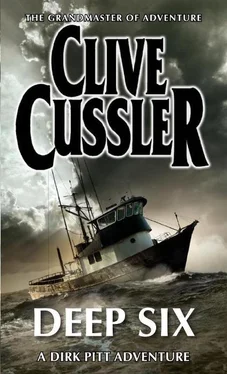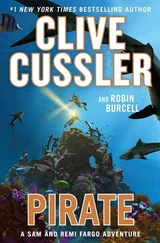“I must know who my subject is,” he said finally, mustering his courage and returning her stare.
Her answer burst like a bomb in the cavernous room, reverberated in Lugovoy’s brain and left him stunned. He felt as though he’d been thrown into a bottomless pit with no hope of escape.
After years of buffeting by storms at sea, the drums containing the nerve agent had broken the chains holding them to wooden cradles and now they lay scattered about the deck of the cargo hold. The one-ton standard shipping containers, as approved by the Department of Transportation, measured exactly 81½ inches in length by 30½ inches in diameter. They had concave ends and were silver in color. Neatly stenciled on the sides in green paint were the Army code letters “GS.”
“I make the count twenty drums,” said Pitt.
“That tallies with the inventory of the missing shipment,” Mendoza said, the relief audible in her voice.
They stood in the hold’s depths, now brightly lit by floodlights connected to a portable generator from the Catawba. Nearly a foot of water flooded the deck, and the sloshing sounds as they waded between the deadly containers echoed off the rusting sides of the hold.
An EPA chemist made a violent pointing motion with his gloved hand. “Here’s the drum responsible for the leak!” he said excitedly. “The valve is broken off its threads.”
“Satisfied, Mendoza?” Pitt asked her.
“You bet your sweet ass,” she exclaimed happily. Pitt moved toward her until their faceplates were almost touching. “Have you given any thought to my reward?”
“Reward?”
“Our bargain,” he said, trying to sound earnest. “I found your nerve agent thirty-six hours ahead of schedule.”
“You’re not going to hold me to a silly proposition?”
“I’d be foolish not to.”
She was glad he couldn’t see her face redden under the helmet. They were on an open radio frequency and every man in the room could hear what they were saying.
“You pick strange places to make a date.”
“What I thought,” Pitt continued, “was dinner in Anchorage, cocktails chilled by glacier ice, smoked salmon, elk Remington, baked Alaska. After that—”
“That’s enough,” she said, her embarrassment growing.
“Are you a party girl?”
“Only when the occasion demands,” she replied, coming back on even keel. “And this is definitely not the occasion.”
He threw up his arms and then let them drop dejectedly. “A sad day for Pitt, a lucky day for NUMA.”
“Why NUMA?”
“The contamination is on dry land. No need for an underwater salvage job. My crew and I can pack up and head for home.”
Her helmet nodded imperceptibly. “A neat sidestep, Mr. Pitt, dropping the problem straight into the Army’s lap.”
“Do they know?” he asked seriously.
“Alaskan Command was alerted seconds after you reported discovering the Pilottown. A chemical warfare disposal team is on its way from the mainland to remove the agent.”
“The world applauds efficiency.”
“It’s not important to you, is it?”
“Of course it’s important,” Pitt said. “But my job is finished, and unless you have another spill and more dead bodies, I’m going home.”
“Talk about a hard-nosed cynic.”
“Say ‘yes.’ “
Thrust, parry, lunge. He caught her on an exposed flank. She felt trapped, impaled, and was annoyed with herself for enjoying it. She answered before she could form a negative thought. “Yes.”
The men in the hold stopped their work amid enough poison to kill half the earth’s population and clapped muted gloves together, cheering and whistling into their transmitters. She suddenly realized that her stock had shot up on the Dow Jones. Men admired a woman who could ramrod a dirty job and not be a bitch.
Later, Dover found Pitt thoughtfully studying a small open hatchway, shining his flashlight inside. The glow diminished into the darkness within, reflecting on dull sparkles on the oil-slicked water rippling from the cargo hold.
“Got something in mind?” Dover asked.
“Thought I’d do a little exploring,” Pitt answered.
“You won’t get far in there.”
“Where does it lead?”
“Into the shaft tunnel, but it’s flooded nearly to the roof. You’d need air tanks to get through.”
Pitt swung his light up the forward bulkhead until it spotlighted a small hatch at the top of a ladder. “How about that one?”
“Should open into cargo hold four.”
Pitt merely nodded and began scaling the rusty rungs of the ladder, closely followed by Dover. He muscled the dog latches securing the hatch, swung it open and clambered down into the next hold, again followed by Dover. A quick traverse of their lights told them it was bone empty.
“The ship must have been traveling in ballast,” Pitt speculated out loud.
“It would appear so,” said Dover.
“Now where?”
“Up one more ladder to the alleyway that runs between the fresh water tanks into the ship’s storerooms.”
Slowly they made their way through the bowels of the Pilottown, feeling like gravediggers probing a cemetery at midnight. Around every corner they half expected to find the skeletons of the crew. But there were no bones. The crew’s living quarters should have looked like an anniversary sale at Macy’s — clothes, personal belongings, everything that should have been strewn about by a crew hastily abandoning ship. Instead, the pitch-black interior of the Pilottown looked like the tunnels and chambers of a desert cavern. All that was missing were the bats.
The food lockers were bare. No dishes or cups lined the shelves of the crew mess. Even the toilets lacked paper. Fire extinguishers, door latches, furnishings, anything that could be unbolted or was of the slightest value was gone.
“Mighty peculiar,” muttered Dover.
“My thought too,” Pitt said. “She’s been systematically stripped.”
“Scavengers must have boarded and carried away everything during the years she was adrift.”
“Scavengers leave a mess,” Pitt disagreed. “Whoever was behind this job had a fetish for neatness.”
It was an eerie trip. Their shadows flitted on the dark walls of the alleyways and followed alongside the silent and abandoned machinery. Pitt felt a longing to see the sky again.
“Incredible,” mumbled Dover, still awed by what they’d found, or rather not found. “They even removed all the valves and gauges.”
“If I was a gambling man,” said Pitt thoughtfully, “I’d bet we’ve stumbled on an insurance scam.”
“Wouldn’t be the first ship that was posted missing for a Lloyd’s of London payday,” Dover said.
“You told me the crew claimed they abandoned the Pilottown in a storm. They abandoned her all right, but they left nothing but a barren, worthless shell.”
“Easy enough to check out,” said Dover. “Two ways to scuttle a ship at sea. Open the sea cocks and let her flood, or blow out the bottom with explosive charges.”
“How would you do it?”
“Flooding through the sea cocks could take twenty-four hours or more. Time enough for a passing ship to investigate. I opt for the charges. Quick and dirty; put her on the seafloor in a matter of minutes.”
“Something must have prevented the explosives from detonating.”
“It’s only a theory.”
“Next question,” Pitt persisted. “Where would you lay them?”
“Cargo holds, engine room, most any place against the hull plates so long as it was below the waterline.”
“No sign of charges in the after holds,” said Pitt. “That leaves the engine room and the forward cargo holds.”
Читать дальше












